The South African franchise sector is by far the largest in Africa – and it continues to flourish. So much so that the Franchising Association of Southern Africa’s (FASA’s) 2023 South African Franchise Market Survey reveals that its contribution to gross domestic product (GDP) has grown from 10% to 15% over the past 10 years.
There has also been a 43% increase in franchisees in the past 5 years, indicating that it remains a popular choice for those looking for successful business opportunities. And there is still room to grow if you consider that in other developed and developing countries, franchising contributes 25% to 75% of economic output.
So, if you want to start a new business, franchising could be an excellent option. But how do you narrow your choices and select the franchise system that’s the best fit for your passion and skill set?
To franchise or not to franchise?
Deciding on whether to start your own business or become a franchisee depends on many factors, but the most important is your personality. With a franchise, you can be your own boss while benefiting from a proven product or service.
But if needing to make decisions on every detail of a business is important to you and deep down you know you could have difficulty following someone else’s direction, especially when you don’t agree with them, then franchising may not be for you.
Having said that, becoming a franchisee of a solid, reliable franchise system offers many advantages over starting your own business. It removes much of the guesswork of running a business and helps you avoid many of the mistakes that independent start-up business owners make.
Top franchisers offer a recognised name, a successful concept and a proven business model, as well as provide training and support.
Karen Keylock, national retail services manager at Nedbank Commercial Banking, says that part of what you are investing in when you join a mature franchise system is a proven operation system, making it a recession-resistant model that is especially relevant and attractive in the current economic environment.
‘The latest FASA research highlights what a stable and robust segment franchising is, with 89% of franchisees reporting that they broke even within the first year of operation. This is remarkable, considering non-franchise businesses typically take 2 to 3 years to break even.
What’s more, this number increased from 69% in 2019 – an extraordinary achievement given the extreme turbulence businesses have had to endure over the period.’
Decisions, decisions
One of the first considerations when selecting a franchise system is deciding which sector to buy into. A franchise may earn you money, but it won’t improve your quality of life if it’s in a field you don’t enjoy.
Take a moment to truly consider what you want to spend 40-plus hours per week doing. You can find franchises in nearly any industry but South African franchisees that are most optimistic about future growth are in automotive products and services; building, office and home services; and business-to-business service categories.
Operators in the real estate and childcare, education and training categories are also optimistic, while those in the dine-in, fast-food and quick-service restaurant categories are less so.
Let’s talk about the money
There are franchises for every budget and costs vary significantly by industry and business model. As a guide, the 2023 survey revealed that there is a correlation between the initial price paid (usually listed as the franchise fee and cost of equipment) and the size of the outlet, with small outlets costing an average of around R500,000 and very large outlets costing in the region of R650,000.
However, Keylock advises looking beyond the initial investment needed to buy into a franchise. ‘Getting a franchise up and running can involve hefty upfront costs and the need to survive on break-even books, or even net losses, before your outlet takes off.
The FASA research indicates that average working capital costs are currently around R750,000 for a retail franchise, while an automotive product and service outlet requires about R400,000.
Fortunately, financial institutions recognise that franchises are relatively safe business opportunities, so financing is readily available.’
Go deeper
By now, you should have a clearer idea of the type of business that ignites your interest and how much you have available to invest.
The next step is to start researching potential franchises within those parameters. There are many ways to do this, including attending trade shows, doing desktop research or even investigating brands that you admire.
For any opportunities that make the shortlist, Keylock advises doing research, research and more research: ‘Your first source of information on a franchise company will be the company itself. It will typically be able to provide you with material such as franchise brochures, links to franchisee testimonials, and data on the industry in general. But we strongly advise delving deeper by doing your own research on their reputation and, importantly, speaking to several franchisees invested in the same system.’
The FASA survey underscores the resilience of the South African franchising industry, with 53% of franchisees having been in business for more than 10 years and 80% owning more than one franchised outlet of the same brand.
It also highlights the satisfaction levels of franchisees, with 9 out of 10 expressing high levels of satisfaction with their franchiser and return on investment. When one looks forward, their business confidence levels are higher than the broader economy, with 98% of franchisers and 88% of franchisees optimistic that turnover will grow over the next 12 months.
‘Franchising certainly offers a safer way of getting into business and becoming financially independent,’ says Keylock. ’The value that a recognised brand brings and the support that an established franchiser offers are significant, as is the improved access to finance. By doing your homework thoroughly upfront, you’ll be taking the first step to setting yourself up for success.’















































